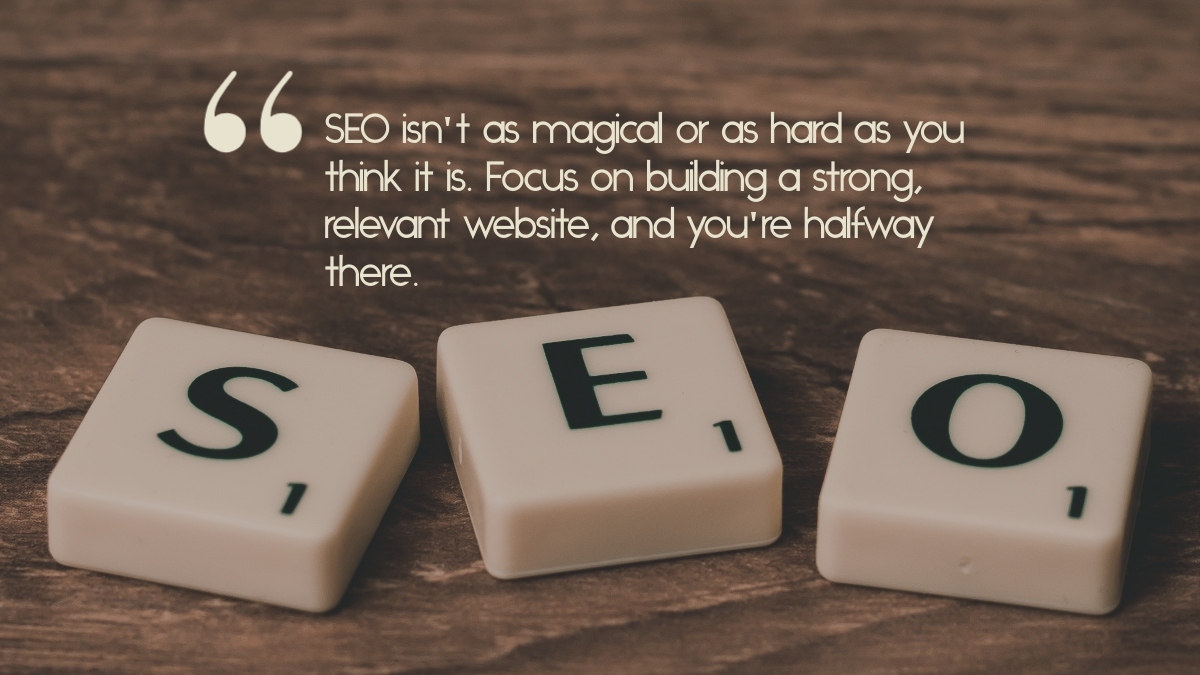SEO: a practical real-world guide

I’m gonna say it. SEO (Search Engine Marketing) isn’t all it’s cracked up to be.
“Wait, WHAAAAT?” you gasp! “I thought SEO was a critical piece of my marketing, the most important thing for my website, the be-all, end-all of making sure my business is successful, the Alpha and Omega of my strategy…”
Sorry. It’s not. I know what you’ve read. I know what all the marketing “experts” tell you before handing you a proposal to “fix” your site for thousands of dollars.
If you’re still reading, let me explain what I mean. I’m not saying search engine rankings aren’t important; that would be crazy talk (they absolutely are). What I’m saying is that the almost mystic reverence given to the idea of “Search Engine Optimization” is hooey. SEO is important, yes. But not magic.
Many years ago, in the early days of Google, there were definitely tactics that would artificially and positively impact your rankings. Keyword stuffing, backlinks, loading up your site with hundreds of largely superfluous pages… the list goes on and on. It was really a game to some unscrupulous players out there: “how do we scam the system without doing a bunch of hard work?”
At the end of the day, these situations all highlighted a critical problem with the budding world of the internet: manipulation of the user experience to benefit one party at the expense of another.
Fortunately, Google, Amazon, Bing, and others have all gotten smarter over time. They continually update their algorithms to reduce the possibility of their user bases being misled. At the end of the day, they generate income based on the accuracy and enjoyability of the experience users have when they visit their sites.
Are there still ways to manipulate the system? Indeed. There will always be individuals looking for the easy way out, the “angle” to play that will give them an unfair advantage. But, over time, it will continue to be more and more difficult to do so—and less profitable as well. And, Google and the others can, and will, actually punish you if they believe you’re doing something purely with the goal of manipulating rankings.
So, what’s the answer? I said earlier that rankings are definitely important… so what DOES work when it comes to SEO?
The simple answer is “Your site needs to be good.” And by good, I mean:
- Your website needs relevant content that your user finds valuable. If your site is about Algerian Food and how to cook it, you’d be better off making sure there are recipes for Algerian Kefta and Chorba Adas than loading up your H1 tags with the term “Algerian Food”. (Can you tell what I made for dinner last night? It was yummy!). And yes, you should absolutely pay attention to your top keywords when you write copy, particularly headlines, but not to the detriment of your user experience.
- Your site is aasy to navigate. Don’t bury your best, most relevant content 6 pages deep in some obscure out-of-the-way place that no one will ever go. People won’t dig around on your site; if they can’t find what they need pretty darn quick, they’ll bail out. Google knows that and it likely plays into their algorithm.
- It has a decent quantity of content. Yes, as noted above, loading up your site with 100 pages just to have 100 pages won’t work… but if your Algerian Food site only has two recipes, Google’s going to give your competitor, who has 163 recipes, more weight in their rankings. (It’s a concept SEOMoz refers to as “Domain Authority”)
- It contains relevant and high quality backlinks. Wait, I disparaged backlinks earlier… I can’t possibly have it both ways? Actually, I can. What I’m talking about here is links to other RELEVANT sites. If the Algerian Embassy in the US links to my recipe for Kefta, that’s going to have a lot more relevance than if Billy Bob’s Tire and Repair does.
- It just runs well. If your site loads quickly and is well-built, you’ll reap the rewards. Again, Google’s looking to reward sites that offer the best experience for their customers, and going to a site that takes forever to load, has a bunch of busted links, and continually goes down is NOT a good experience.
So, really, at the end of the day, the keys to achieving “good” rankings are much like the keys to having a successful business. There are no easy, work-free, routes to success. But the good news is that common sense goes a long way. If you ask yourself whether your site delivers a great experience and can honestly say is a place you’d want to visit as a consumer, then you’re on the right track.
That said, it’s time for some lunch. Lahm Lalou, anyone?
Happy small business marketing,
Theron & Katie
At Urban Sherpa Marketing Co. we offer marketing advisory, strategic planning, and services for small businesses and startups, including content marketing. Our goal is to make high-quality marketing possible for every business, no matter the size. Think of us as your outsourced marketing department, strategic marketing adviser, or even your phone-a-friend marketing lifeline. We specialize in building efficient marketing programs to grow your business without blowing the bank.
Share this on:

